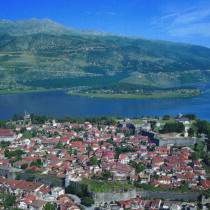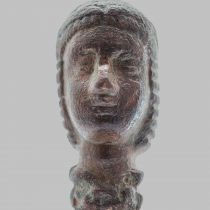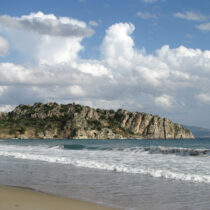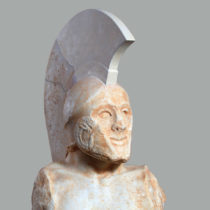Six ancient cities piled one on top of the other
The six ancient cities were found deep underground in Kaifeng, in the east of China's Henan province.
World’s oldest plant-like fossils discovered
Scientists at the Swedish Museum of Natural History have found fossils of 1.6 billion-year-old probable red algae.
Art Nouveau from Karlsruhe to Athens
The exhibition provides a kaleidoscopic image of the complex character of the Art Nouveau.
Did humans create the Sahara desert?
New research investigating the transition of the Sahara from a lush, green landscape 10,000 years ago to the arid conditions found today suggests that humans may have played an active role in its desertification.
Algiers metro works archaeological site will incorporate a museum
An archaeological site discovered during metro works in Algiers, which has yielded valuable findings from a 2,000-year period, will host a museum.
The Roc-aux-Sorciers shelter, a palaeolithic site with its exceptional sculptures
This next Palaeolithic Seminar will be given next Thursday in Athens.
400,000-year-old fossil human cranium is oldest ever found in Portugal
Oldest fossil human cranium found in Portugal marks an important contribution to knowledge of human evolution during the middle Pleistocene in Europe and to the origin of the Neandertals.
Aboriginal hair shows 50,000 years connection to country
DNA in hair samples collected from Aboriginal people across Australia in the early to mid-1900s has revealed that populations have been continuously present in the same regions for up to 50,000 years.
University of Leicester in new project to identify Jack the Ripper’s last known victim
Research reveals likelihood of finding and identifying Mary Jane Kelly -- and using DNA to determine her true identity.
Nominate a heritage site for the 7 Most Endangered programme 2018
Nominate a heritage site for the 7 Most Endangered programme 2018. The deadline for nominations is 30 June 2017.
How big brains evolved could be revealed by new mathematical model
A new mathematical model could help clarify what drove the evolution of large brains in humans and other animals, according to a study published in PLOS Computational Biology.
A new app provides information on artworks
A new app allows users to scan artworks with their Smartphone camera and get information on them as well as create a digital collection.
Statues of pharaoh and powerful goddess found in Luxor
Archaeologists in Egypt have discovered a magnificent statue of king Amenhotep IIIand 66 parts of statues of goddess Sekhmet in Luxor.
Two Ramesside statues have been revealed in Matariya
Two Ramesside statues have been found in Matariya in Cairo, submerged in ground water in the vicinity of a temple commissioned by King Ramses II in the temple precinct of ancient Heliopolis.
Fish, selective hunting strategies and a delayed-return lifestyle among ancient foragers
A unique trove of bone material from the 9,200 year old coastal settlement Norje Sunnansund in Blekinge, Sweden, has revealed that surpisingly sophisticated hunting strategies were used at the time.
The selection of archaeological research material should be re-evaluated
In her doctoral dissertation, Tuula Tynjä studies the way the method of retrieval influences the quality and quantity of archaeological objects for research.
Discovery of widespread platinum may help solve Clovis people mystery
The study, authored by 10 researchers, builds on similar findings of platinum –an element associated with cosmic objects like asteroids or comets– found by Harvard University researchers in an ice-core from Greenland in 2013.
Stone Age burial garment identified in new study
Archaeologists have identified a burial garment from a Stone Age grave after new analyses have been carried out on a finding discovered in the 1970s.
Silk Road evolved as ‘grass-routes’ movement
Asia's ancient highland network was structured by ecological strategies of nomadic herders.
Specialized beetles shed light on predator-prey associations in the Cretaceous
Cascomastigus from about 99 million years ago represents the earliest known predators specialized for capturing springtails, pushing back the age of such predation by at least 54 million years.
Dental plaque DNA shows Neandertals used ‘aspirin’
This extraordinary window on the past is providing us with new ways to explore and understand our evolutionary history through the microorganisms that lived in us and with us.
Ancient reptile mystery solved as 2 extinct species found to be the same
This is the most extensive scientific study ever published comparing the two species.
Memory: Lost and Recovered Heritage
The Polish National Commission for UNESCO and the International Cultural Centre in Krakow are proud to hold the World Heritage Young Professionals Forum 2017.
The Grand Egyptian Museum to open by mid-2018
Antiquities Minister Khaled al-Anany annouced that the Grand Egyptian Museum will opened in mid-2018.




























